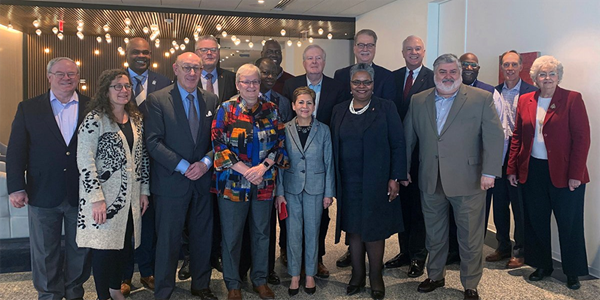A much-trumpeted plan for amicable separation unveiled in early 2020 no longer offers a path forward for The United Methodist Church, say more than a quarter of the agreement’s negotiators.
Five of the 16-member mediation team released a statement late June 7 rescinding their support for the agreement.
In the statement, they said, “we can no longer in good faith support the Protocol of Reconciliation & Grace through Separation or work towards its adoption at the next General Conference.” The denomination’s top lawmaking assembly is now delayed to 2024.
Your support of The General Administration Fund apportionment implements trustworthy administrative oversight like the General Conference sessions.
What has changed the calculus, they say, is the ongoing COVID-19 pandemic and the launch of a theologically conservative breakaway denomination.
“The desire of those listed is simply to be honest and transparent about what we know about the current intentions of many General Conference delegates we represent related to the protocol legislation,” said Berlin, lead pastor of Floris United Methodist Church in Herndon, Virginia. He represented centrist groups as part of the mediation.
The group’s statement put it this way: “The overwhelming consensus among those with whom we spoke is that the once-promising Protocol Agreement no longer offers a viable path forward, particularly given the long delays, the changing circumstances within The United Methodist Church, and the formal launch of the Global Methodist Church in May of this year.”
None of the bishops who served on the mediation team signed on to the statement. The seven bishops released their own response June 9 affirming the work that went into the protocol.
"We acknowledge that the Protocol is now in legislative form and is the appropriate discernment of the delegates to the upcoming General Conference," the bishops' response said.
The bishops added that they "are united in respect for our colleagues who are led to step away from the Protocol, and pray that we will continue to explore ways to celebrate the ministry of The United Methodist Church even as we work for an amicable separation with those who chose to depart from our fellowship."
What now?
While they no longer endorse the protocol as a whole, the statement’s signers say they and their constituents still back some of the agreement’s “most essential provisions.”
The signers are still committed to finding constructive paths for individual congregations to disaffiliate from The United Methodist Church; to acknowledging the historical role of the Methodist movement in systemic racism and supporting the continued abeyance on all administrative or judicial processes related to the disagreements that have plagued the denomination for several decades.
For now, the protocol remains duly submitted legislation for General Conference delegates to consider.
excerpt from a story by Heather Hahn, assistant news editor, UMNews
One of seven apportioned giving opportunities of The United Methodist Church, the General Administration Fund implements trustworthy administrative oversight, supports the legislative processes of the church and curates The United Methodist Church’s rich history. Please encourage your leaders and congregations to support the General Administration Fund apportionment at 100 percent.





